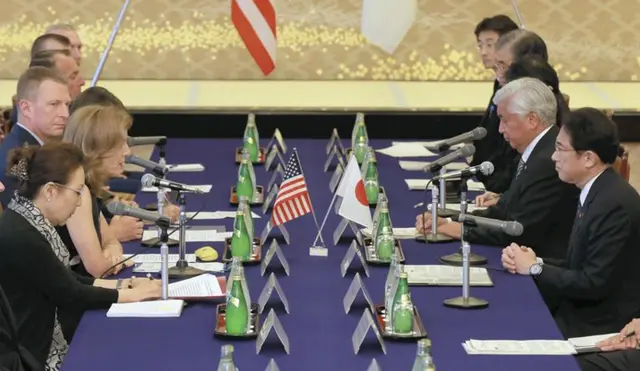According to the Japan News, senior officials of the Japanese and U.S. governments agreed on Tuesday to effectively narrow the range of personnel who make up the civilian component of the U.S. military under the Japan-U.S. Status of Forces Agreement (SOFA).
SOFA agreement: Stipulates the status of the U.S. military and handling of criminal cases
It is reported by Xinhua News Agency that the agreement was reached at the meeting at the Iikura Guest House in Tokyo of Foreign Minister Fumio Kishida, Defense Minister Gen Nakatani, U.S. Ambassador to Japan Caroline Kennedy and Lt. Gen. John Dolan, the commander of the U.S. Forces in Japan.
The agreement is part of the measures that have been discussed by the two governments to prevent the recurrence of incidents like a murder case in which a member of the U.S. civilian component has been indicted for killing a woman in Okinawa Prefecture.
The SOFA stipulates the status of the military and other personnel of the U.S. forces stationed in Japan and the handling of criminal cases involving them. Narrowing the range of the civilian component would expand the jurisdiction of Japan’s judicial authorities.
The SOFA defines civilian component only as “the civilian persons of United States nationality who are in the employ of, serving with, or accompanying the United States armed forces in Japan.”
The latest agreement concretely shows the four categories of the civilian component, and limits the range of the civilian component for private companies’ employees to technical advisers or consultants who are officially invited by the U.S. forces in Japan. The advisers and consultants must fulfill such criteria as having high-level skills and knowledge, and being indispensable to the mission of the U.S. forces in Japan. The two governments will continue to discuss and define which specific occupations would correspond to such advisers and consultants.
Okinawa Governor:Concern about the effectiveness of SOFA
Okinawa Governor Takeshi Onaga said Tuesday that he was concerned about the effectiveness of the planned revision of SOFA in preventing incidents caused by U.S. military personnel following a joint announcement made by the Japanese and U.S. governments to narrow the scope of workers protected by SOFA.
The Japanese and U.S. governments announced Tuesday that they have agreed to narrow the scope of U.S. military base workers protected by SOFA.Photo:The Japan News
The Japanese and U.S. governments announced Tuesday that they have agreed to narrow the scope of U.S. military base workers protected by the Japan-U.S. Status of Forces Agreement (SOFA), a bilateral pact that gives U.S. servicemen and civilian workers in Japan privileged legal status.
Under the 1960 pact, the U.S. justice system, instead of Japanese courts, has the primary right of jurisdiction over crimes committed by U.S base service members and their "civil component" if the accused was "acting on official duty," which is often criticized as overprotective of U.S. Base workers and giving them immunity from Japanese law.
The revised version of the pact narrowed the scope of "civil component" by restricting it to four categories: civilians paid by the U.S. government to work for the U.S. military in Japan; civilians working on ships and aircraft operated by the military; civilians working for the U.S. government and staying in Japan for official purposes related to the military; and technical advisers and consultants staying in Japan at the invitation of the military.
Regarding the change, Onaga said it was not thorough enough and he would continue to pay close attention to the negotiations between the Japanese and U.S. governments on the issue.
Statistics from local media in Okinawa showed that as of March 2013, there were 52,092 U.S. servicemen and civilian workers, with the civilian workers accounting for only 3.6 percent. Under the new pact, the number of civilian workers enjoying privileged legal status in Okinawa would only reduce by an estimated 10 percent.
On an earlier occasion, Onaga said that in order to solve the problems caused by the U.S. military bases, it was necessary to thoroughly review the SOFA instead of just revising the terms regarding the primary jurisdiction of U.S. Forces.
U.S. foreign minister:Reduce thecivilian employees subject to extraterritorial protections
According to New York Times,Mr. Kishida, the U.S. foreign minister, said the agreement would reduce the number of civilian employees subject to extraterritorial protections, but it remained unclear by how much.
Under the deal, civilians would be divided into four categories, depending on the nature of their employment with the military and whether they were based in Japan or passing through for temporary assignments.
Negotiators will begin working to clarify the extent of those protections, according to the agreement, by “evaluating categories of positions eligible for status as members of the civilian component.”
An activist waved a sign saying “Don’t Rape Okinawa,” as American personnel walked toward a United States Marine base on the island in May.Photo:The New York Times
The revision came as anti-U.S. Sentiment in Okinawa, which hosts some 75 percent of U.S. bases in Japan, has been on the rise following a series of crimes committed by U.S. military-linked personnel including murder, rape, assault and a series of drunk driving cases.
Rallies have been held across the island prefecture, protesting against the crimes and demanding overhaul of the SOFA as well as removal of the U.S. military bases.
Mr. Shinzato fell into that category: After leaving the Marines, he married an Okinawan woman and settled on the island. Although the United States has not sought to bring his case under its jurisdiction — there is no evidence that the young woman was killed while he was on duty, meaning he would not qualify for special treatment — the episode has nonetheless put a focus on civilian workers.
(APD)
 简体中文
简体中文

